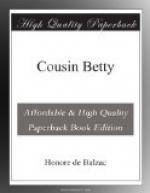“I know,” said he, with a look at Lisbeth that was at once affectionate and plaintive, “but for you I should long since have ceased to live. But, my dear lady, artists require relaxation——”
“Ah! there we come to the point!” cried she, interrupting him, her hands on her hips, and her flashing eyes fixed on him. “You want to go wasting your health in the vile resorts of Paris, like so many artisans, who end by dying in the workhouse. No, no, make a fortune, and then, when you have money in the funds, you may amuse yourself, child; then you will have enough to pay for the doctor and for your pleasure, libertine that you are.”
Wenceslas Steinbock, on receiving this broadside, with an accompaniment of looks that pierced him like a magnetic flame, bent his head. The most malignant slanderer on seeing this scene would at once have understood that the hints thrown out by the Oliviers were false. Everything in this couple, their tone, manner, and way of looking at each other, proved the purity of their private live. The old maid showed the affection of rough but very genuine maternal feeling; the young man submitted, as a respectful son yields to the tyranny of a mother. The strange alliance seemed to be the outcome of a strong will acting constantly on a weak character, on the fluid nature peculiar to the Slavs, which, while it does not hinder them from showing heroic courage in battle, gives them an amazing incoherency of conduct, a moral softness of which physiologists ought to try to detect the causes, since physiologists are to political life what entomologists are to agriculture.
“But if I die before I am rich?” said Wenceslas dolefully.
“Die!” cried she. “Oh, I will not let you die. I have life enough for both, and I would have my blood injected into your veins if necessary.”
Tears rose to Steinbock’s eyes as he heard her vehement and artless speech.
“Do not be unhappy, my little Wenceslas,” said Lisbeth with feeling. “My cousin Hortense thought your seal quite pretty, I am sure; and I will manage to sell your bronze group, you will see; you will have paid me off, you will be able to do as you please, you will soon be free. Come, smile a little!”
“I can never repay you, mademoiselle,” said the exile.
“And why not?” asked the peasant woman, taking the Livonian’s part against herself.
“Because you not only fed me, lodged me, cared for me in my poverty, but you also gave me strength. You have made me what I am; you have often been stern, you have made me very unhappy——”
“I?” said the old maid. “Are you going to pour out all your nonsense once more about poetry and the arts, and to crack your fingers and stretch your arms while you spout about the ideal, and beauty, and all your northern madness?—Beauty is not to compare with solid pudding —and what am I!—You have ideas in your brain? What is the use of them? I too have ideas. What is the good of all the fine things you may have in your soul if you can make no use of them? Those who have ideas do not get so far as those who have none, if they don’t know which way to go.




